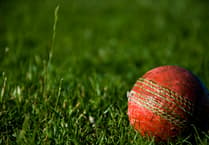THANKS to the Wrecclesham History Project, the village now a permanent memorial to the legendary 18th century cricketer, William ‘Silver Billy’ Beldham.
The old sign depicting Beldham, which hung over The Cricketers pub for time immemorial, has been erected at the recreation ground, next to Yew Tree Cottage, where Beldham once lived, and the opening ceremony was performed at the village fete by a rather more recent England cricketer, Graham Thorpe.
What other village in Britain could have produced two international sportsmen whose careers followed such similar paths?
Graham said it was a pleasure for him to unveil the tribute to Billy Beldham and to be associated with it. He added: “We both lived in Wrecclesham and went on to play for England. Our careers followed parallel lines, but Billy apparently fathered 36 children – I don’t know about that,” indicating the two daughters accompanying him.” (although legend has it that Beldham had up to 36 children by two wives, he in fact fathered a mere nine)
As explained by John Birch, the project director of the Wrecclesham History Project and the driving force behind the scheme, the sign had been taken down when the pub closed in 2006 and was replaced by the Bengal Lounge Indian restaurant.
The sign was later found in the basement by the Bengal’s owner who offered it to the village. Just over a year ago, the Wrecclesham History Project enquired about the sign and it needed some detective work to track it down to Barnham in West Sussex where it had been stored and looked after by Audrey Jackman, a former Wrecclesham resident.
The Project decided that the most appropriate place for it to be erected was on the recreation ground, where cricket is played, next to Billy Beldham’s house.
John Birch thanked the sponsors who had contributed to the Project, many of whom were present. He drew particular attention to the Farnham Trust, represented by chairman Martin Lloyd, who had recently purchased Yew Tree Cottage, where Beldham is thought to have been born and lived for part of his life. The house is a fine example of a 16th century cottage and will be available to visit, by invitation, during the Farnham Heritage Week in September.
The sign shows Silver Billy in old age, although still holding a bat, but in his prime, in the late 1790s, Beldham was the ‘Ian Botham’ of the game, a household name during the golden age of Hambledon cricket when the gentry wagered huge sums on the outcome of games.
After playing for Farnham, Surrey and England, often at the Holt Pound Oval just outside Wrecclesham, Beldham became one of the renowned Hambledon cricketers and with two in-laws, John and James Wells, would travel the 27 miles across Hampshire on horseback, usually on the day of the match.
Playing on rough pitches in the underarm era of cricket, Beldham altogether played 189 first-class matches between 1788 and 1821 and scored 7,045 runs at an average of 21.48, including three centuries and 38 half-centuries, with a top score of 144. He took 213 wickets and held 333 catches (mostly in the slip area) and, for good measure, made 49 stumpings.
Probably his finest performance was for Surrey against England in 1794 at the original Lord’s ground when he scored 72 and 104, took at least two wickets and held three catches, helping Surrey win by 197 runs
Officially, he played his last first-class match in 1821, aged 55, but there is strong anecdotal evidence that he continued to play to a very advanced age. He retired to live in Tilford, where he was the landlord of the Barley Mow. He spent the last 41 years of his life in Tilford living at Oak Cottage, alongside the green. He died in Tilford in 1862 at the grand age of 96 and is buried in an unmarked grave at All Saints Church.
Graham Thorpe, now England’s batting coach, played for Wrecclesham and Farnham – like his older brothers, Ian and Alan – before signing as a professional for Surrey. His father Geoff is now Farnham’s chairman and Ian has captained the 2nd XI for many years, with mother Toni the long-serving scorer.
Graham broke into the England team at 23 and went on to play 100 times for his country. With a classic left-hander’s technique and an attacking instinct, he was one of the few to master Shane Warne when the great leg-spinner burst on the scene in the 1993 Ashes series.
Thorpe went on to score 6,744 runs for England, with 16 centuries and 39 half-centuries and a top score of 200 not out. His average of 44.66 places him amongst the very best to have played for England.

.jpg?width=209&height=140&crop=209:145,smart&quality=75)

.jpeg?width=209&height=140&crop=209:145,smart&quality=75)
Comments
This article has no comments yet. Be the first to leave a comment.